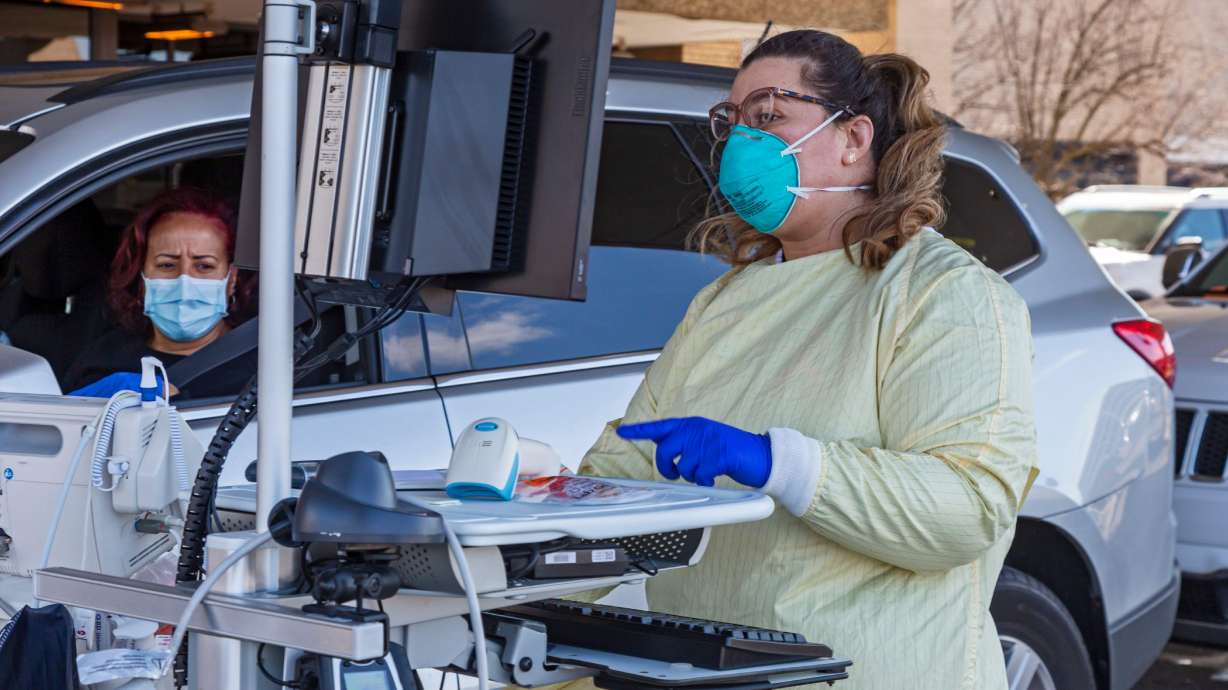Estimated read time: 4-5 minutes
This archived news story is available only for your personal, non-commercial use. Information in the story may be outdated or superseded by additional information. Reading or replaying the story in its archived form does not constitute a republication of the story.
WASHINGTON — The U.S. Centers for Disease Control and Prevention is shortening the isolation time for health care workers who test positive for COVID-19, as it anticipates a surge in hospitalizations due to the omicron variant.
The agency's new guidelines say health care workers with COVID-19 may return to work after seven days if they are asymptomatic and test negative, and that the "isolation time can be cut further if there are staffing shortages," according to a statement Thursday.
"Our goal is to keep health care personnel and patients safe, and to address and prevent undue burden on our health care facilities," CDC Director Dr. Rochelle Walensky said in a statement.
In its new guidelines, CDC added that the negative test result should come within 48 hours of going back to work, and that this shortened time frame may also apply to some symptomatic staff — provided they are "mildly symptomatic" and their symptoms are improving.
The agency also specified that health care workers don't need to quarantine "following high-risk exposures" if they've gotten all recommended vaccinations, including a booster shot. Quarantine refers to when people who have been exposed to the virus but have not yet been diagnosed with an infection and need to avoid others.
'The right move'
The CDC stressed that the new guidelines don't extend to the general public and only apply to the health care workforce.
Others who have COVID-19 should isolate for 10 full days, according to CDC guidance. For those who have been in contact with someone with COVID-19, fully vaccinated people do not need to quarantine if they have no symptoms. However, CDC does recommend they get tested five to seven days later and mask up in indoor public spaces in the meantime.
The Infectious Diseases Society of America said they "greatly appreciate CDC updating its guidance so rapidly," adding these "approaches are crucial to ensure we have the necessary health care workforce to respond to the growing Omicron surge."
CNN medical analyst Dr. Leana Wen called the CDC's decision to update its guidance "the right move" so that hospitals are not at overcapacity from a staffing shortage caused by the isolation guidelines.
But while the isolation period has been relaxed for health care workers, some health experts, including Wen, and business leaders are hoping that the CDC will consider loosening the period for all vaccinated Americans. The United Kingdom has already shortened the isolation period for anyone with COVID-19. Airlines, including Delta and JetBlue, are among those pushing the CDC to cut the isolation time for their workers, arguing that it would help avoid issues such as flight cancellations.
"Even if you end up missing some individuals who may still be infectious, if you're able to get many more people to comply with a shorter period instead of dis-incentivizing them for having such a long isolation period, that may be worth the tradeoff as well," Wen, a former Baltimore City health commissioner, told CNN's Wolf Blitzer on Thursday.
Dr. Ashish Jha, dean of the Brown University School of Public Health, also argues that fully vaccinated people who test positive for COVID-19 should not have to isolate the full 10 days if they test negative in less than that time.
Jha called for studies to be done to determine the exact time period for isolation while suggesting a five-to-seven-day isolation window with a negative rapid test result.
"Getting people back out of isolation is really critical to keeping things going and also just creating an incentive for people to get tested so they don't have to be isolated for 10 days," Jha said on CNN on Thursday, adding that the CDC's new guidelines for health care workers are a "step in the right direction."
The CDC said in its statement Thursday that it "continues to evaluate isolation and quarantine recommendations for the broader population as we learn about the omicron variant and will update the public as appropriate."
Walensky also told CBS News on Wednesday that the CDC is "actively examining those data now and doing some modeling analyses to assess" whether to relax its isolation guidelines for all Americans.
"We anticipate that we'll have some updates soon," she said.









